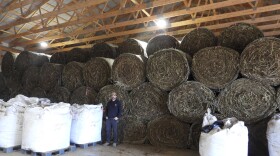Women have helped on farms for generations, but now they’re beginning to take ownership of their duties, calling themselves farmers instead of just farmers’ wives. The US Department of Agriculture has found a steady increase of women farmers in the 2000s, which plateaued in the agency’s latest 5-year report.
It’s a rainy day at River Bend Farms. The fields are muddy but that doesn’t keep Alana Baker from her work. During previous drier days she’s planted early beans, side dressed corn and spraying the crops for weed control.
Earlier in the day she attended the cattle with her father and has a page long to-do list next to her in the pickup truck she drives around the 5,000 acres her family farms.
Baker never thought she’d come home to farm, but while working as a fundraiser for the American Cancer Society nearly two years ago she says she woke up and just knew it was time. What she didn’t know that day was that her decision then would mean so much more in the coming year.
“Dad’s getting older, and I knew if I wanted an opportunity to work with him and learn from him that I needed to do that while I didn’t have kids, while I wasn’t married,” Baker said. “It’s worked out well because we found out in January Dad’s got cancer. If I hadn’t been here for a year before that it would have been way too much to come home and just jump right into.”
Baker’s father is the main operator, but she’s taking on many of those responsibilities since he’s become ill. Baker now runs the farm when he’s away on treatments.
Since she grew up in the farming community she says she hasn’t faced too many setbacks as a woman in the male-dominated industry. But on occasion she has had to assert that she’s the one to do business with for River Bend Farms.
“The only obstacles I really face are with people that we don’t know,” she said. “So like seed salesmen and things like that they come here that they want to talk to the male of the operation. I’m like well, there’s not one. You have to talk to me.”
Samantha Anderson is also a farmer’s daughter studying at Murray State and working to eventually run her family’s tobacco, crop and cattle farm in central Kentucky. Like Baker, she says she hasn’t experienced much discrimination at all as a woman farmer.
What she has seen though is women becoming more and more involved in agriculture.
“If you look at the gender spread within FFA the girls are taking over,” Anderson said. “That’s not necessarily saying that more girls are going back to the farm but within the broad field of agriculture in general girls are making a really big impact.”
Women made up about 14 percent of farm operators in the U.S. Department of Agriculture’s 2007 and 2012 Census. Compare that to numbers from 30 years ago: In 1982 not even a full percentage point of operators were women.
Both the USDA and Murray State sociology professor Scott Byrd say part of that is the rise of the small farm. Most women farmers run operations much smaller than those Anderson and Baker call home.
“A lot of women are turning back to the land,” Byrd said. “They’re going back and self-identifying as farmers for various reasons. Maybe they want to be involved in more sustainable practices for their family and their local community. Maybe they’re involved in food justice. A lot of those farms are smaller farms.”
Byrd says more women also inherit farmland now, where previously it went to male family members. Other factors leading women to self-identify as farmers include increased technology. Decades ago, most women just did not have the physical strength required for farmwork. Now there are tools that make that work easier.
Back at River Bend Farms, Baker watches as a farmhand cleans a tractor with a large sprayer. She says she’s going to send their handful of workers home early since a rainy day is a welcome rest during the busy planting season. Inside the home her family has lived in for generations, Baker’s father Stan rests. He’s glad she’s around.
“I always kind of hoped she’d that someday she might want to come back because there’s really nobody else to take the farm and run with it like it needs to be,” he said.
Baker says her skills, some of which she admits are stereotypically feminine, have already helped bring the farm forward. She’s organized and keeps lists along with a database of what’s been planted so her family can keep track of what methods are best.






